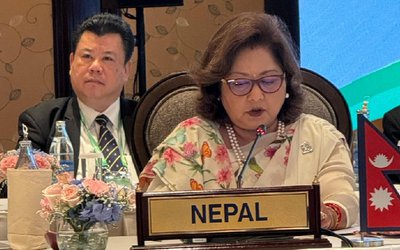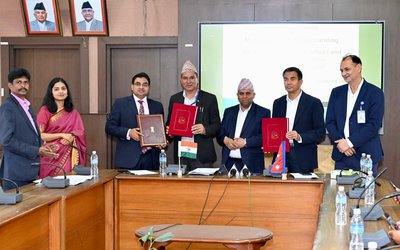
Sharing Nepal's initiatives, efforts and achievements on biodiversity conservation, accepting 'biodiversity resources a lifeline' and 'mountain ecosystem a unique laboratory and true source of knowledge', Rt. Hon. Prime Minister Mr. K.P. Sharma Oli urged the international community to 'set more ambitious targets with … people's right over natural resources and its sustainable protection' and 'need for sustained investment in biodiversity conservation'. This call was made at the Biodiversity Summit under the theme 'urgent action on biodiversity for sustainable development' on 30 September 2020 during the 75th session of the UN General Assembly (UNGA). The Prime Minister linked 'climate crisis' with the 'existential threat', and emphasised on the urgency for climate action at the UNGA general debate on 25 September 2020, and reiterated on Climate Vulnerable Forum Leaders Event on 7 October 2020 (https://www.spotlightnepal.com/2020/10/08/nepal-stands-limiting-global-temperature-15oC-pm-oli/). The PM's statements highlight Nepal's commitments on biodiversity conservation and urgency for climate actions to protect people and resources. Biodiversity loss is also linked climate crisis.
Understanding the increased pressure on and loss of biodiversity, international community has realised the urgency of conserving biodiversity at ecosystem, species and genetic levels as clearly reflected while observing the International Biodiversity Day on 22 May and World Environment Day on 5 June this year (https://www.spotlightnepal.com/2020/06/03/world-environment-day-2020-promoting-biodiversity-conservation/). Several events, including the 14th International Conference on Community-based Adaptation (CbA) in September 2020 which urged to promote nature-based solutions to address the threats of climate change and biodiversity and called for 'development partners to make longer commitments' with recognition of young people to take leadership, have reiterated to stop rapid loss of biodiversity and urgency of its conservation.
At country level, several efforts are underway to conserve biodiversity since half-a-century. Nepal's efforts in engaging local people in biodiversity conservation within and outside protected areas have been well recognised by the international community. However, there are 'dangerous initiatives' as well to destroy forest biodiversity in the name of 'game changer' projects. Possible conversion of Nijgadh forests into airport questions our commitments on biodiversity conservation.
The government approved 2018 Environmental Impact Assessment (EIA) Report of Second International Airport Project (the Nijgadh airport) clearly mentioned 87 percent of its entire project area (8,045 ha) as dense forest. Over half of the area is dominated by Sal forest. The report considered over 3900 seedlings/ha and well-established sapling over 700/ha as 'healthy sign for good Sal forest'. Based on EIA report, the Project will directly affect 585,499 matured trees and 1,864,820 pole-sized different species in this 'least disturbed ... one of the largest and richest biodiversity' of Terai forests. This forest being the 'corridor' of wild elephant has high conservation significance with possible devastation from elephants in absence of this 'corridor' forest. Equally, this area provides habitat for large mammals, including indigenous, endangered and threatened wildlife. The project, if implemented, will lead to 'disappear' location-specific rich biodiversity, compel wild animals to leave their 'best habitat' or migrate to the Parsa Wildlife Reserve or other forests, and induce human & wildlife conflict.
Loss of forest area for airport construction will result to annual loss of 25,580 tons of carbon sequestration and nearly 61 million tons of oxygen release potentials. The EIA report estimated annual loss of ecological services equivalent to over NRs. 231 billion from Nijgadh forests. The report has categorically evaluated loss of indigenous, endangered and threatened plant species, biodiversity and species of conservation significance, and wildlife's habitat loss and displacement as 'significant impact' (https://www.spotlightnepal.com/2020/06/05/world-environment-day-2020-nepal-bio-diversity-nijgadh-forest-under-threat/). Approved Terms of Reference for EIA study dictates the need for considering forest as important criteria for alternative analysis. This criteria was not considered but alternative analysis mentioned non-implementation of the project results to retention of large forest area as beneficial impact and implementation of the project results to loss of large dense forest, create ecological unbalance and greater effect to 'groundwater recharge and storage' which might convert downstream cropland into 'dryland'. In addition, Gaur Bazar from Lal Bakaiya and Gadhimai from Pasaha rivers will likely submerge during rainy season.
Hon. Minister for Culture, Tourism and Civil Aviation, Mr. Yoesh Bhattarai is pushing to cut trees and 'destroy habitat' by directing officials to clear forest defying the order of the Supreme Court (https://www.spotlightnepal.com/2020/10/05/nijgadh-airport-row-petitioners-file-contempt-court-against-tourism-minister-bhattarai/). People have continuously raised concerns and urged for not to construct Nijgadh airport at the cost of large chunk of unbelievable loss of valuable timber and non-timber plant species, wildlife habitat, elephant corridor, and biodiversity (ecosystem, species and genetic levels) in totality.
The Government is now in better position to conserve Nijgadh forests as airport construction in Bhairawa and Pokhara is nearing to completion; international travel is likely to decline with continuation of virtual meetings; Supreme Court has yet to decide on petition and issued interim order not to cut trees; Zurich airport has declined to construct the Nijgadh airport; national funding is sufficiently below the required investment; no other organisations have shown interest with concrete 'proposal and resources' to construct this proposed airport; flight path is yet to agree upon; detailed feasibility study has not been released or prepared transparently; approved EIA report is technically challenged as impacts are not linked to airport activities; approved EIA report estimated the loss of nearly 2.5 million trees which requires compensatory plantation in over 38,000 ha - nearly 5 times of the size of proposed airport area (8,045 ha); acquisition of private land is yet to be fully compensated; Nijgadh airport is technically inappropriate from economic and environmental perspectives; several reports urged to cut minimum number of trees with no need for constructing smart city in airport area and possibility of shifting the airport towards south or linking with Simara airport. Almost all these concerns are related to conservation of this rich biodiversity area.
Taking into consideration the irreversible adverse impacts of proposed Nijgadh airport on forest biodiversity and 'intrinsic' commitments of the Prime Minister, also made on 30 September 2020 at UN special event on biodiversity, it is appealed to translate international commitments into action by 'immediately stopping' all activities related to destruction of pristine forest biodiversity of Nijgadh area.
Uprety is a former Joint-Secretary and Chief of Climate Change Management Division, then Ministry of Environment, Government of Nepal, E-mail: upretybk@gmail.com

Batu Uprety
Former Joint-Secretary and Chief of Climate Change Management Division, Ministry of Environment (then), and former Team Leader, National Adaptation Plan (NAP) formulation process. E-mail: upretybk@gmail.com
- Sagarmatha Sambad: Likely Bearing the Fruits
- Mar 27, 2025
- Decadal Experience In Preparing The NDC
- Mar 03, 2025
- Over Five Decades Of Concern On Air Pollution
- Jan 16, 2025
- Damaging The Functional EIA Track
- Dec 22, 2024
- Baku CoP29 Outcomes And Nepal's Initiatives
- Nov 26, 2024














